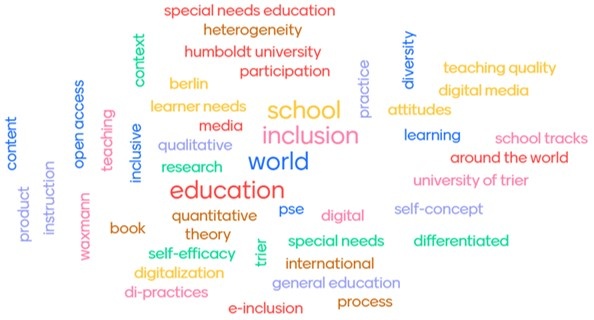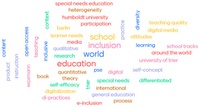
PSE-Inklusion in der Schule: CfP Open Access Book on DI
The following page provides all information concerning the call for papers on the special issue open access book "DI around the World – Exploring Differentiation Instructional Practice in General School Education".
The special issue book "DI around the World - Exploring Differentiated Instructional Practice in General School Education" is an open access book publication funded by the University Library and the Special Funds for Inclusion of the Professional School of Education from the Humboldt-Universität zu Berlin and published by Waxmann. The present open access book follows an international perspective including research from all over the world.
Guest Editors
Dr. Verena Letzel (University of Trier)
Junior-Prof. Dr. Marcela Pozas (Professional School of Education, Humboldt-University of Berlin)
Scope and Significance of the Proposed Theme
With the increasingly diverse student population in schools, the establishment of inclusive classrooms has become a top international policy priority (UNESCO, 2020). Worldwide, inclusive education is a highly important topic of policy debate that “emphasize[s] the concepts of efficiency, effectiveness, equity, and inclusion as a means of ensuring quality education for all” (Watkins, 2017, p. 1). With this background, the concept of inclusive education has shifted from the inclusion of students with disabilities, to the provision of equal opportunities in education celebrating the diversity of all learners (Schwab, 2020; Watkins, 2017). To achieve this aim, schools must become “more responsive to children with a diverse range of abilities, cultures, gender, religions, and other situations and issues that present in the classroom” (Loreman, 2017, p. 2). Differentiated instruction (DI) is considered as vehicle to achieve inclusive education (Loreman, 2017; Tomlinson, 2017; UNESCO, 2017) that aims to meet students’ individual learning needs by maximizing learning opportunities (Gheyssens et al., 2020). DI is defined as the intentional, systematically planned and reflected practices that enable teachers to meet the needs of all learners in heterogeneous classrooms (Graham et al., 2021; Letzel et al., 2020). Scientific literature has recognized DI as an important teaching quality domain (Maulana et al., 2020) and core element of effective teaching that seeks to ensure equity as well as educational justice (Lindner & Schwab, 2020; OECD, 2012; Valiandes & Neophytou, 2018). The implementation of DI is by no means just a normative recommendation, but an important criterion of high-quality teaching and professionalization (Klieme, 2018). Additionally, DI has been included within prominent teaching quality model conceptualizations and studies regarding the domains of teaching quality (Bell et al., 2019; Hattie, 2009; Praetorius et al., 2018; Van de Grift, 2014).
Although research into DI is substantially increasing, a recent scoping review (Graham et al., 2021) and a bibliometric analysis (Sun & Xiao, 2021) on DI research has identified important shortcomings: 1) a gap on research concerning DI in general school education, 2) a lack of focus on the planning, employing and evaluating of concrete DI practices, 3) their effects on students’ achievement and non-achievement outcomes, 4) influence of context factors (i.e. school track, teacher characteristics, school resources), and 5) an underrepresented international research output.
Submission Types
We welcome empirical and theoretical papers stemming from all countries around the world and addressing the aforementioned limitations in the current DI research. Lastly, research during the COVID-19 pandemic indicated that DI in the digital context was seldom implemented (Letzel et al., 2020). Thus, papers focusing on a post pandemic digital approach to the practice of DI are strongly invited.
Intended Readership
The readership will be broad. These might be specialists in the field of elementary education, primary education, secondary education, special education, and higher education. Further, researchers in education in general, as well as researchers in the field of teacher training, specialists in digital media and digital learning processes and teachers as well as politicians will also be considered as potential readership. Additionally, the articles should provide insights into DI research to all educational stakeholders and public.
Timeline and Manuscript Submission Process
Submission deadline for abstracts: January 31st, 2022
Abstracts should contain maximum 300 words providing information on research question(s), methodology as well as description of data analysis process.
The abstracts can be sent directly to Dr. Verena Letzel: letzel@uni-trier.de
- February 11th, 2022: Invitations for full manuscript submission will be sent to authors
- May 15th, 2020: Full manuscript submission deadline
- June-August 2022: Reviewers’ feedback will be sent to authors & Revised manuscripts due from authors
- August 15th, 2022: Feedback of revised manuscripts returned to authors
- September 30th, 2022: Final revisions must be received; editorial decisions
- Full manuscripts will be published in (to be agreed with Publisher)
General inquiries can be addressed to the Guest Editors:
Dr. Verena Letzel: letzel@uni-trier.de
Junior-Prof. Dr. Marcela Pozas: marcela.pozas.guajardo@hu-berlin.de
References
Bell, C. A., Dobbelaer, M. J., Klette, K. & Visscher, A. (2019). Qualities of classroom observation systems. School Effectiveness and School Improvement, 30(1), 3–29. https://doi.org/10.1080/09243453.2018.1539014
Gheyssens, E., Coubergs, C., Griful-Freixenet, J., Engels, N. & Struyven, K. (2020). Differentiated instruction: the diversity of teachers’ philosophy and praxis to adapt teaching to students’ interests, readiness and learning profiles. International Journal of Inclusive Education, 1–18. https://doi.org/10.1080/13603116.2020.1812739
Graham, L. J., De Bruin, K., Lassig, C., and Spandagou, I. (2021). A Scoping Review of 20 Years of Research on Differentiation: Investigating Conceptualisation, Characteristics, and Methods Used. Review of Education, 9(1), 161–198. https://doi.org/10.1002/rev3.3238.
Hattie, J. (2009). Visible learning: A synthesis of over 800 meta-analyses relating to achievement. Routledge.
Klieme, E. (2018). Teaching quality: Core content implemented through evidence-based methods with structure, support and challenge.
Letzel, V., Pozas, M., and Schneider, C. (2020). Energetic students, stressed parents, and nervous teachers: A comprehensive exploration of inclusive homeschooling during the COVID-19 crisis. Open Education Studies, (2), p. 159-170. https://doi.org/10.1515/edu-2020-0122
Letzel, V., Schneider, C., and Pozas, M. (2020). Binnendifferenzierende Herangehensweisen zum Umgang mit Heterogenität im Unterricht der Sekundarstufe I: Vorschlag einer Taxonomie zur Systematisierung [Differentiated instruction as a means to handle in-classroom student heterogeneity in secondary education: proposal of a taxonomy]. Empirische Pädagogik, 34(4), 331-349.
Lindner, K.-H., and S. Schwab. 2020. “Differentiation and Individualisation in Inclusive Education: A Systematic Review and Narrative Synthesis.” International Journal of Inclusive Education. https://doi.org/10.1080/13603116.2020.1813450.
Loreman, T. (2017). Pedagogy for Inclusive Education. Oxford Research Encyclopedia of Education.
Maulana, R., Smale-Jacobse, A., Helms-Lorenz, M., Chun, S. & Lee, O. (2020). Measuring differentiated instruction in the Netherlands and South Korea: Factor structure equivalence, correlates, and complexity level. European Journal of Psychology of Education, 35(4), 881–909. https://doi.org/10.1007/s10212-019-00446-4
OECD. (2012). Equality and Quality in Education: Supporting Disadvantaged Students and Schools. OECD Publishing. https://doi.org/10.1787/9789264130852-en
Praetorius, A.-K., Klieme, E., Herbert, B. & Pinger, P. (2018). Generic dimensions of teaching quality: the German framework of Three Basic Dimensions. ZDM: mathematics education, 50(3), 407–426.
Schwab, S. (2020). Inclusive and Special Education in Europe. Oxford Research Encyclopedia of Education Oxford University Press. https://doi.org/10.1093/acrefore/9780190264093.013.1230.
Sun, Y., & Xiao, L. (2021). Research trends and hotspots of differentiated instruction over the past two decades (2000-2020): a bibliometric analysis. Educational Studies, 1-17.UNESCO. (2017). A Guide for Ensuring Inclusion and Equity in Education. https://unesdoc.unesco.org/ark:/48223/pf0000248254
Tomlinson, C. A. (2017). How to differentiate instruction in academically diverse classrooms. 3rd Edition. Alexandria, Virginia: ASCD.
UNESCO. (2020). Global Education. monitoring report 2020: Inclusion and education: All means all.
Valiandes, S. & Neophytou, L. (2018). Teachers’ professional development for differentiated instruction in mixed-ability classrooms: investigating the impact of a development program on teachers’ professional learning and on students’ achievement. Teacher Development, 22(1), 123–138. https://doi.org/10.1080/13664530.2017.1338196
van de Grift, W., Seyeoung, C., Maulana, R., Lee, O., and Helms-Lorenz, M. (2017). Measuring Teaching Quality and Student Engagement in South Korea and the Netherlands. School effectiveness and school improvement, 28(3), 337–49. https://doi.org/10.1080/09243453.2016.1263215.
Watkins, A. (2017). Inclusive Education and European Educational Policy. Oxford Research Encyclopedia of Education. Retrieved 9 Dec. 2021, from https://oxfordre.com/education/view/10.1093/acrefore/9780190264093.001.0001/acrefore-9780190264093-e-153.


